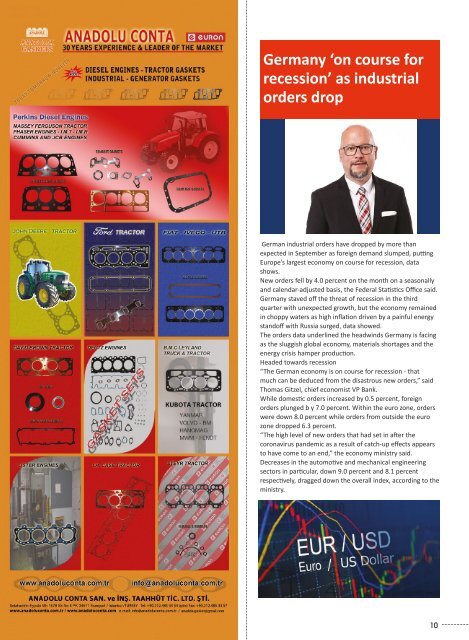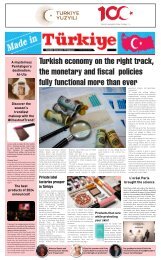Automotive Exports December 2022
Create successful ePaper yourself
Turn your PDF publications into a flip-book with our unique Google optimized e-Paper software.
Germany ‘on course for<br />
recession’ as industrial<br />
orders drop<br />
German industrial orders have dropped by more than<br />
expected in September as foreign demand slumped, putting<br />
Europe’s largest economy on course for recession, data<br />
shows.<br />
New orders fell by 4.0 percent on the month on a seasonally<br />
and calendar-adjusted basis, the Federal Statistics Office said.<br />
Germany staved off the threat of recession in the third<br />
quarter with unexpected growth, but the economy remained<br />
in choppy waters as high inflation driven by a painful energy<br />
standoff with Russia surged, data showed.<br />
The orders data underlined the headwinds Germany is facing<br />
as the sluggish global economy, materials shortages and the<br />
energy crisis hamper production.<br />
Headed towards recession<br />
“The German economy is on course for recession - that<br />
much can be deduced from the disastrous new orders,” said<br />
Thomas Gitzel, chief economist VP Bank.<br />
While domestic orders increased by 0.5 percent, foreign<br />
orders plunged b y 7.0 percent. Within the euro zone, orders<br />
were down 8.0 percent while orders from outside the euro<br />
zone dropped 6.3 percent.<br />
“The high level of new orders that had set in after the<br />
coronavirus pandemic as a result of catch-up effects appears<br />
to have come to an end,” the economy ministry said.<br />
Decreases in the automotive and mechanical engineering<br />
sectors in particular, down 9.0 percent and 8.1 percent<br />
respectively, dragged down the overall index, according to the<br />
ministry.<br />
10

















